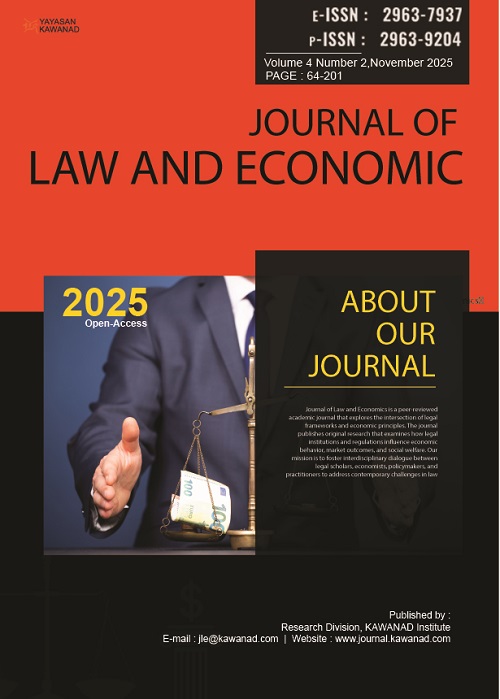TEMPLATE
- masriali@unsyiah.ac.id
- Banda Aceh City, Indonesia
- +6281360650791
Articles
- Home
- Archives
- Vol. 4 No. 2 (2025): NOVEMBER
- Articles
- Home
- Archives
- Vol. 4 No. 2 (2025): NOVEMBER
- Articles
Analysis of Child Custody Following Divorce Caused by Apostasy Under Positive Law and Islamic Legal Frameworks (Case Study: Case No. 1189/Pdt.G/2023/PA.Tnk)
- Authors Brian Antonio , Sri Pramudya Wardhani
- Affiliations
- Published 2025-11-30
- Section Articles
- DOI https://doi.org/10.56347/jle.v4i2.328
- Issue Vol. 4 No. 2 (2025): NOVEMBER
0
Views
0
Downloads
Altmetrics
Abstract
This study examines the Tangerang Religious Court's ruling in case number 1189/Pdt.G/2023/PA.Tnk, focusing on child custody disputes arising from apostasy within marital dissolution. The research investigates how Islamic civil law operates within Indonesia's judicial framework, particularly when religious conversion becomes a determining factor in custody arrangements. Employing a normative juridical approach alongside descriptive analytical methods, the investigation draws primary data from court rulings, trial documentation, and judicial reasoning articulated by the panel of judges. Secondary sources encompass statutory regulations, Islamic jurisprudence literature, scholarly journals, and pertinent reference materials. The theoretical foundation rests on Classical Islamic Law principles articulated by Imam Syafi'i, which address the legal implications of apostasy on marital bonds and parental rights, complemented by legal interpretation frameworks developed by Dr. Yahya Harahap, SH., MH., regarding procedural justice in religious courts. The research reveals tensions between protecting children's religious upbringing and applying established custody principles that typically favor maternal care for young children. Findings demonstrate how judges navigate between statutory law, Islamic jurisprudence, and the best interests of the child when apostasy disrupts conventional custody determinations.
Keywords
Gugatan; Judicial Ruling; Legal Pluralism; Maslahah; Child Custody; Apostasy
References
- Abdullah, A. (2024). Problematika Eksekusi Hak Asuh Anak Studi Kasus Perlindungan Hukum Terhadap Anak Yang Belum Mummayiz. Adab Indonesia.
- Badrani, M. (2024). Implementasi Undang-undang Nomor 16 Tahun 2019 Tentang Pembatasan Usia Nikah dan Implikasinya dalam Perspektif Maqashid Syariah (Studi Kasus Di KUA Kokap Kulon Progo) (Tesis Magister, Universitas Islam Indonesia).
- Efendi, Z. (2020). Pelaksanaan eksekusi hak asuh anak (hadhanah) terhadap isteri yang murtad dalam perkara nomor: 398/P.dt.G/2013/PA.Pbr di Pengadilan Agama Pekanbaru. Teraju, 2(01), 1–34. https://doi.org/10.35961/teraju.v2i01.62
- Fikri, & Muchsin, A. (2022). Hak-hak anak dalam hukum keluarga Islam: Pendekatan yurisprudensi di Pengadilan Agama.
- Ghufron, M., & Ali, M. (2020). Nalar integrasi fikih dan psikologi keluarga dalam pandangan hakim agama Jawa Timur tentang hak asuh anak pasangan murtad. Al-Hukama', 10(1), 73–98. https://doi.org/10.15642/alhukama.2020.10.1.73-98
- Hakim, L., & Chandra, M. Z. (2024). Upaya hukum gugatan hak asuh anak oleh suami yang disebabkan istri berpindah agama (Studi putusan nomor 1189/Pdt.G/2023/PA.Tnk). JALAKOTEK: Journal of Accounting Law Communication and Technology, 1(2), 81–91. https://doi.org/10.57235/jalakotek.v1i2.2151
- Husna, N., & Kasdi, A. (2024). Hak Asuh Anak Bagi Perceraian Sebab Istri Murtad (Studi Kasus Putusan PA Semarang Nomor 1101/Pdt. G/2022/PA. Smg.). JIMSYA: Jurnal Ilmu Syariah, 3(1), 120-136.
- Indonesia. (1848). Kitab Undang-Undang Hukum Perdata (Burgerlijk Wetboek). Kodifikasi Tahun 1848.
- Indonesia. (1974). Undang-Undang Nomor 1 Tahun 1974 tentang Perkawinan. Lembaran Negara Republik Indonesia Tahun 1974 Nomor 1.
- Indonesia. (1975). Peraturan Pemerintah Nomor 9 Tahun 1975 tentang Pelaksanaan Undang-Undang Nomor 1 Tahun 1974 tentang Perkawinan. Lembaran Negara Republik Indonesia Tahun 1975 Nomor 12.
- Indonesia. (1991). Kompilasi Hukum Islam: Buku I tentang Perkawinan. Instruksi Presiden Nomor 1 Tahun 1991.
- Indonesia. (1999). Undang-Undang Nomor 39 Tahun 1999 tentang Hak Asasi Manusia. Lembaran Negara Republik Indonesia Tahun 1999 Nomor 165.
- Indonesia. (2002). Undang-Undang Nomor 23 Tahun 2002 tentang Perlindungan Anak. Lembaran Negara Republik Indonesia Tahun 2002 Nomor 109.
- Indonesia. (2019). Undang-Undang Nomor 16 Tahun 2019 tentang Perubahan atas Undang-Undang Nomor 1 Tahun 1974 tentang Perkawinan. Lembaran Negara Republik Indonesia Tahun 2019 Nomor 186.
- Khair, U., Putri, I. H., & Payakumbuh, M. (n.d.). Pelaksanaan hak asuh anak setelah terjadinya perceraian. JCH (Jurnal Cendekia Hukum), 5(2). https://doi.org/10.3376/jch.v5i2.231
- Lubis, S. D. (2023). Kedudukan hak asuh anak pasca terjadinya perceraian dari istri yang murtad menurut hukum Islam. As-Syar'i: Jurnal Bimbingan & Konseling Keluarga, 6(1), 205–212. https://doi.org/10.47467/as.v6i1.3324
- Nugroho, M. A. (2022). Akibat hukum perceraian terhadap hak asuh anak yang disebabkan salah satu pasangan suami istri berpindah agama. Jurnal Kewarganegaraan, 6(2), 3638–3649.
- Rahman, T. A., & Rizkianti, W. (2024). Penyelesaian sengketa hak asuh anak setelah perceraian: Perbandingan antara Indonesia dan Inggris. Jurnal USM Law Review, 7(1), 248. https://doi.org/10.26623/julr.v7i1.8801
- Rofiq, M. K. (2021). Pemberian hak asuh anak dalam perceraian karena peralihan agama (murtad). Journal of Islamic Studies and Humanities, 6(2), 97–110. https://doi.org/10.21580/jish.v6i2.8171
- Sihotang, R. B. (2023). Status Hukum Perkawinan Pasangan Suami Istri Yang Salah Satunya Murtad Dan Hak Asuh Anak Dalam Persfektif Fikih Dan Kompilasi Hukum Islam (Skripsi, UIN Ar-Raniry Fakultas Syariah dan Hukum).
Author Biographies


Similar Articles
Discover other articles with topics similar to what you're currently reading. Find more references and expand your knowledge base.

More Similar Articles
Analysis of Unregistered Child Marriage Practices Through...
Riska Riska, Sri Pramudya Wardhani
Vol. 4 No. 2 (2025): NOVEMBERJuridical Review of Judicial Considerations in Deciding...
Stella Maris Diaz, Debi F.Ng. Fallo, Ngongo Dede
Vol. 4 No. 1 (2025): MAYThe Validity of Purchasing Land Underhand in Land Sale...
Waluyo Slamet Pradoto, FX. Hastowo Broto Laksito
Vol. 3 No. 2 (2024): NOVEMBER 2024Personal Data Security Violations in East Jakarta...
Khairul Alwan Albaldan, Nin Yasmine Lisasih
Vol. 4 No. 2 (2025): NOVEMBERMost read articles by the same author(s)
Related Articles
Riska Riska, Sri Pramudya Wardhani
















